University Business Law Assignment: Contract Terms Analysis
VerifiedAdded on 2019/10/30
|6
|1291
|136
Homework Assignment
AI Summary
This assignment analyzes a business law scenario involving a physical education teacher, Peter, who purchases an office chair. The analysis focuses on whether the seller's representations about the chair's features constitute terms of the contract, distinguishing between puffery and contractual terms. It examines the legal implications of the chair's ability to provide back support, determining whether this is a condition or a warranty. Furthermore, the assignment explores the impact of an exclusion clause on Peter's potential legal claims, referencing relevant case law such as L'Estrange v Graucob and Baldry v Marshall. The conclusion of the assignment assesses the validity of the exclusion clause and Peter's rights in the event of a breach of contract. This document provides a detailed examination of contract law principles applied to a practical business scenario.
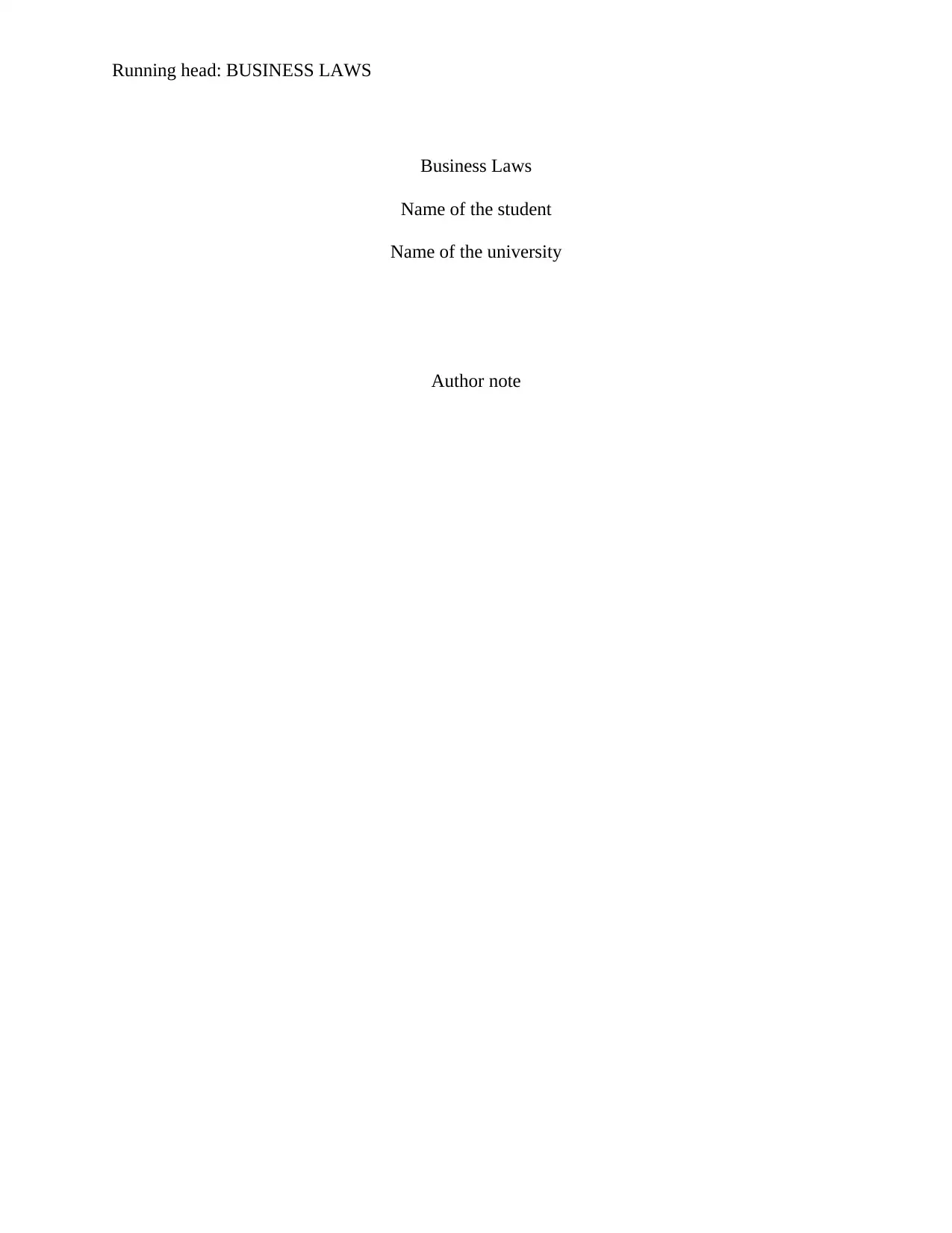
Running head: BUSINESS LAWS
Business Laws
Name of the student
Name of the university
Author note
Business Laws
Name of the student
Name of the university
Author note
Paraphrase This Document
Need a fresh take? Get an instant paraphrase of this document with our AI Paraphraser
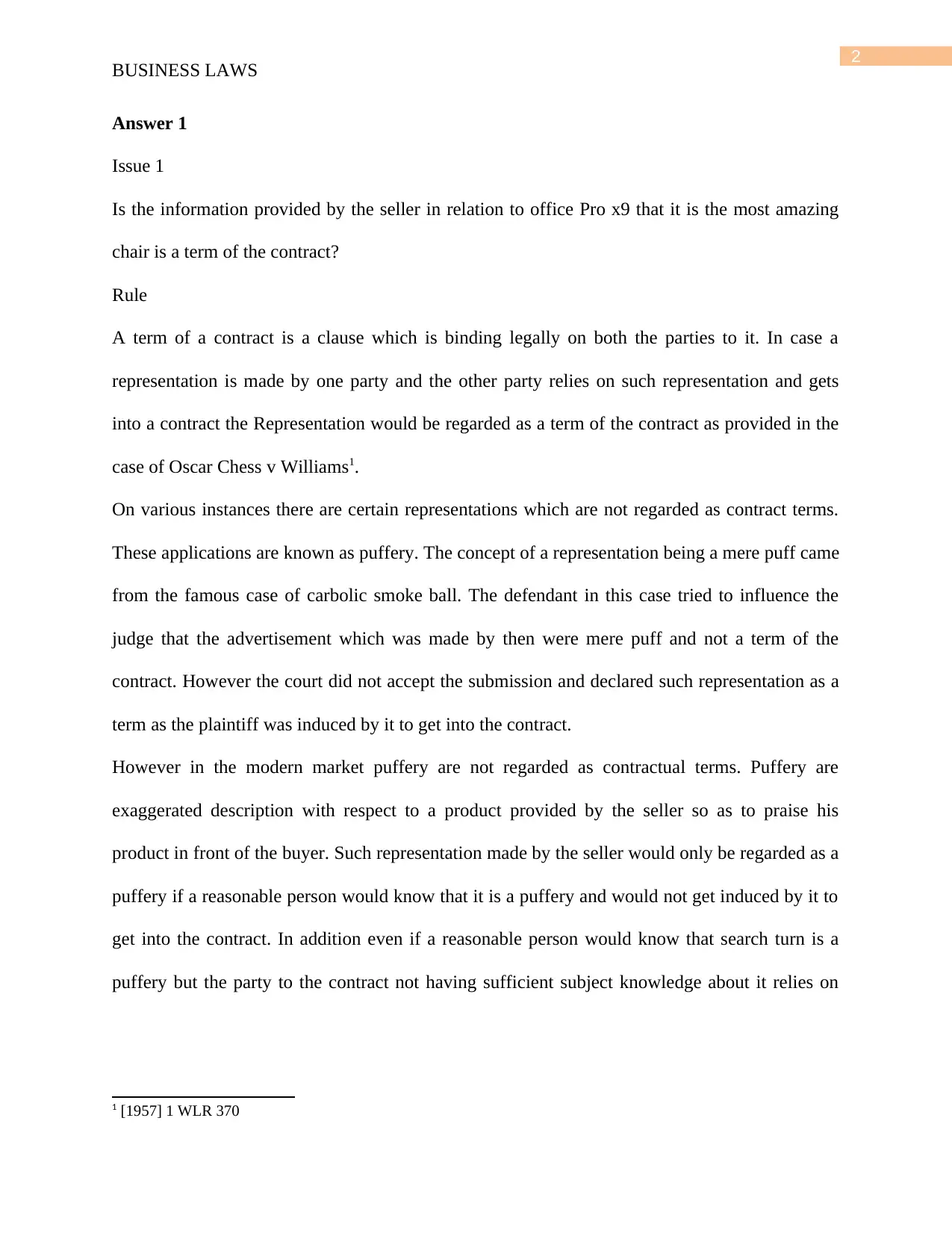
2
BUSINESS LAWS
Answer 1
Issue 1
Is the information provided by the seller in relation to office Pro x9 that it is the most amazing
chair is a term of the contract?
Rule
A term of a contract is a clause which is binding legally on both the parties to it. In case a
representation is made by one party and the other party relies on such representation and gets
into a contract the Representation would be regarded as a term of the contract as provided in the
case of Oscar Chess v Williams1.
On various instances there are certain representations which are not regarded as contract terms.
These applications are known as puffery. The concept of a representation being a mere puff came
from the famous case of carbolic smoke ball. The defendant in this case tried to influence the
judge that the advertisement which was made by then were mere puff and not a term of the
contract. However the court did not accept the submission and declared such representation as a
term as the plaintiff was induced by it to get into the contract.
However in the modern market puffery are not regarded as contractual terms. Puffery are
exaggerated description with respect to a product provided by the seller so as to praise his
product in front of the buyer. Such representation made by the seller would only be regarded as a
puffery if a reasonable person would know that it is a puffery and would not get induced by it to
get into the contract. In addition even if a reasonable person would know that search turn is a
puffery but the party to the contract not having sufficient subject knowledge about it relies on
1 [1957] 1 WLR 370
BUSINESS LAWS
Answer 1
Issue 1
Is the information provided by the seller in relation to office Pro x9 that it is the most amazing
chair is a term of the contract?
Rule
A term of a contract is a clause which is binding legally on both the parties to it. In case a
representation is made by one party and the other party relies on such representation and gets
into a contract the Representation would be regarded as a term of the contract as provided in the
case of Oscar Chess v Williams1.
On various instances there are certain representations which are not regarded as contract terms.
These applications are known as puffery. The concept of a representation being a mere puff came
from the famous case of carbolic smoke ball. The defendant in this case tried to influence the
judge that the advertisement which was made by then were mere puff and not a term of the
contract. However the court did not accept the submission and declared such representation as a
term as the plaintiff was induced by it to get into the contract.
However in the modern market puffery are not regarded as contractual terms. Puffery are
exaggerated description with respect to a product provided by the seller so as to praise his
product in front of the buyer. Such representation made by the seller would only be regarded as a
puffery if a reasonable person would know that it is a puffery and would not get induced by it to
get into the contract. In addition even if a reasonable person would know that search turn is a
puffery but the party to the contract not having sufficient subject knowledge about it relies on
1 [1957] 1 WLR 370
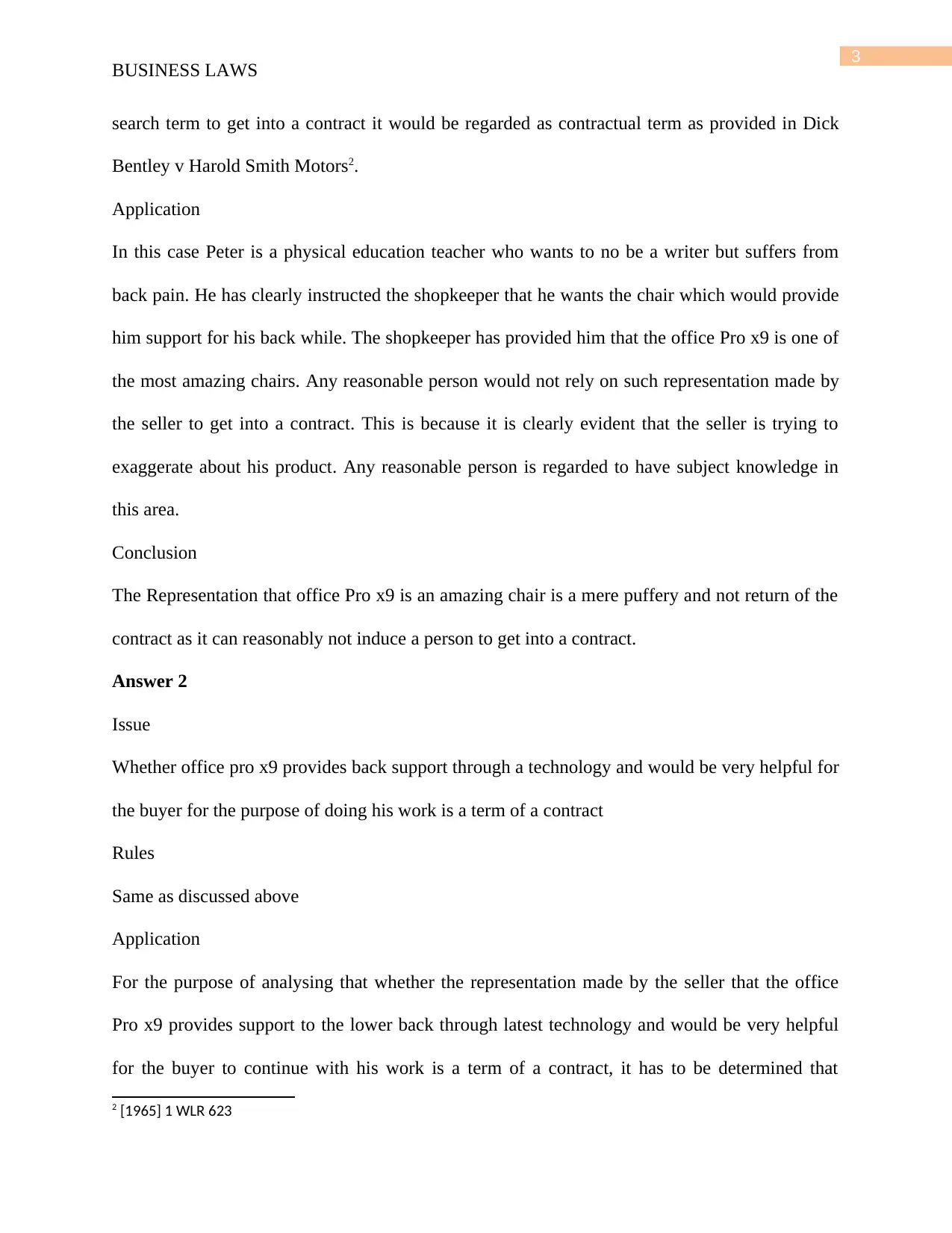
3
BUSINESS LAWS
search term to get into a contract it would be regarded as contractual term as provided in Dick
Bentley v Harold Smith Motors2.
Application
In this case Peter is a physical education teacher who wants to no be a writer but suffers from
back pain. He has clearly instructed the shopkeeper that he wants the chair which would provide
him support for his back while. The shopkeeper has provided him that the office Pro x9 is one of
the most amazing chairs. Any reasonable person would not rely on such representation made by
the seller to get into a contract. This is because it is clearly evident that the seller is trying to
exaggerate about his product. Any reasonable person is regarded to have subject knowledge in
this area.
Conclusion
The Representation that office Pro x9 is an amazing chair is a mere puffery and not return of the
contract as it can reasonably not induce a person to get into a contract.
Answer 2
Issue
Whether office pro x9 provides back support through a technology and would be very helpful for
the buyer for the purpose of doing his work is a term of a contract
Rules
Same as discussed above
Application
For the purpose of analysing that whether the representation made by the seller that the office
Pro x9 provides support to the lower back through latest technology and would be very helpful
for the buyer to continue with his work is a term of a contract, it has to be determined that
2 [1965] 1 WLR 623
BUSINESS LAWS
search term to get into a contract it would be regarded as contractual term as provided in Dick
Bentley v Harold Smith Motors2.
Application
In this case Peter is a physical education teacher who wants to no be a writer but suffers from
back pain. He has clearly instructed the shopkeeper that he wants the chair which would provide
him support for his back while. The shopkeeper has provided him that the office Pro x9 is one of
the most amazing chairs. Any reasonable person would not rely on such representation made by
the seller to get into a contract. This is because it is clearly evident that the seller is trying to
exaggerate about his product. Any reasonable person is regarded to have subject knowledge in
this area.
Conclusion
The Representation that office Pro x9 is an amazing chair is a mere puffery and not return of the
contract as it can reasonably not induce a person to get into a contract.
Answer 2
Issue
Whether office pro x9 provides back support through a technology and would be very helpful for
the buyer for the purpose of doing his work is a term of a contract
Rules
Same as discussed above
Application
For the purpose of analysing that whether the representation made by the seller that the office
Pro x9 provides support to the lower back through latest technology and would be very helpful
for the buyer to continue with his work is a term of a contract, it has to be determined that
2 [1965] 1 WLR 623
⊘ This is a preview!⊘
Do you want full access?
Subscribe today to unlock all pages.

Trusted by 1+ million students worldwide
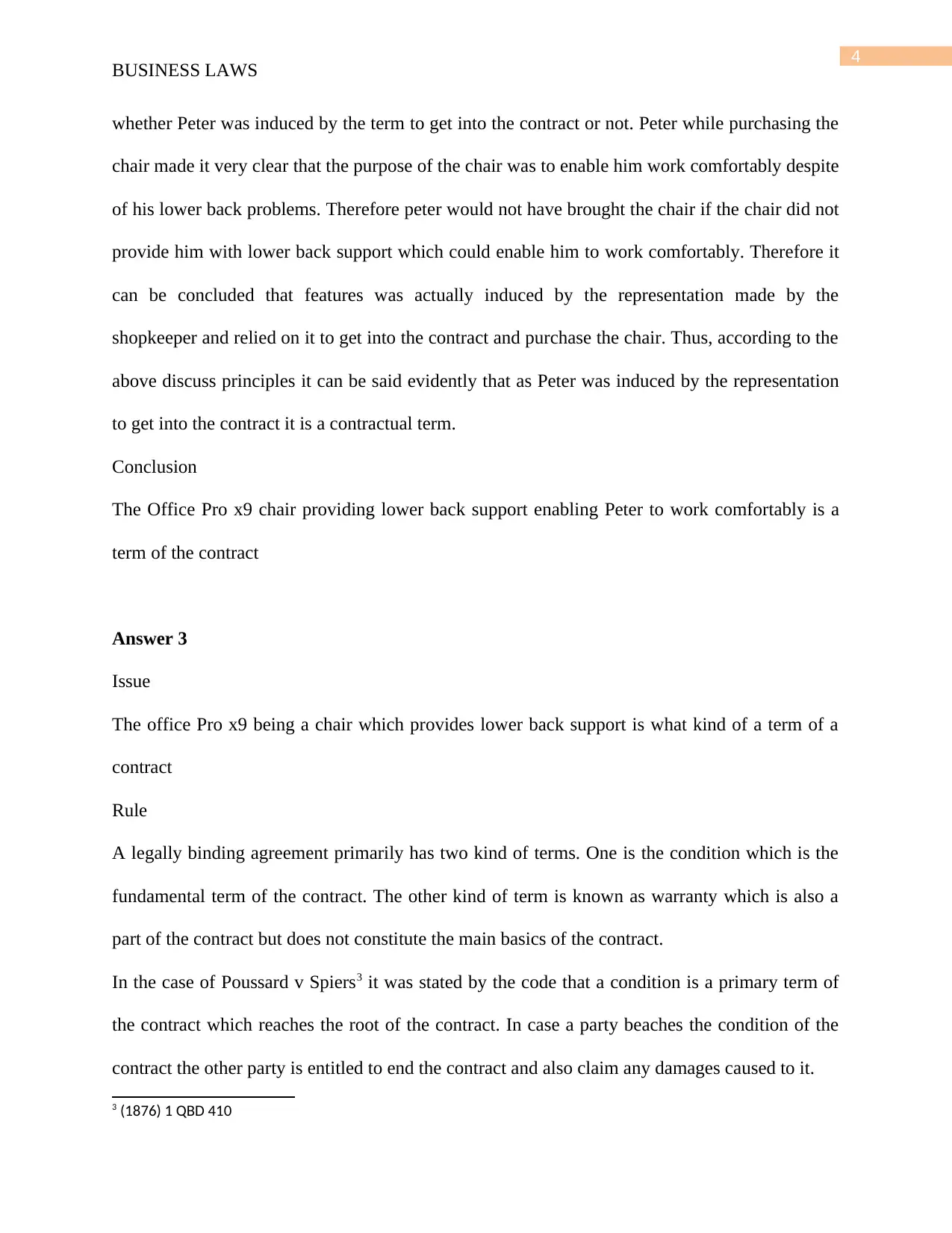
4
BUSINESS LAWS
whether Peter was induced by the term to get into the contract or not. Peter while purchasing the
chair made it very clear that the purpose of the chair was to enable him work comfortably despite
of his lower back problems. Therefore peter would not have brought the chair if the chair did not
provide him with lower back support which could enable him to work comfortably. Therefore it
can be concluded that features was actually induced by the representation made by the
shopkeeper and relied on it to get into the contract and purchase the chair. Thus, according to the
above discuss principles it can be said evidently that as Peter was induced by the representation
to get into the contract it is a contractual term.
Conclusion
The Office Pro x9 chair providing lower back support enabling Peter to work comfortably is a
term of the contract
Answer 3
Issue
The office Pro x9 being a chair which provides lower back support is what kind of a term of a
contract
Rule
A legally binding agreement primarily has two kind of terms. One is the condition which is the
fundamental term of the contract. The other kind of term is known as warranty which is also a
part of the contract but does not constitute the main basics of the contract.
In the case of Poussard v Spiers3 it was stated by the code that a condition is a primary term of
the contract which reaches the root of the contract. In case a party beaches the condition of the
contract the other party is entitled to end the contract and also claim any damages caused to it.
3 (1876) 1 QBD 410
BUSINESS LAWS
whether Peter was induced by the term to get into the contract or not. Peter while purchasing the
chair made it very clear that the purpose of the chair was to enable him work comfortably despite
of his lower back problems. Therefore peter would not have brought the chair if the chair did not
provide him with lower back support which could enable him to work comfortably. Therefore it
can be concluded that features was actually induced by the representation made by the
shopkeeper and relied on it to get into the contract and purchase the chair. Thus, according to the
above discuss principles it can be said evidently that as Peter was induced by the representation
to get into the contract it is a contractual term.
Conclusion
The Office Pro x9 chair providing lower back support enabling Peter to work comfortably is a
term of the contract
Answer 3
Issue
The office Pro x9 being a chair which provides lower back support is what kind of a term of a
contract
Rule
A legally binding agreement primarily has two kind of terms. One is the condition which is the
fundamental term of the contract. The other kind of term is known as warranty which is also a
part of the contract but does not constitute the main basics of the contract.
In the case of Poussard v Spiers3 it was stated by the code that a condition is a primary term of
the contract which reaches the root of the contract. In case a party beaches the condition of the
contract the other party is entitled to end the contract and also claim any damages caused to it.
3 (1876) 1 QBD 410
Paraphrase This Document
Need a fresh take? Get an instant paraphrase of this document with our AI Paraphraser
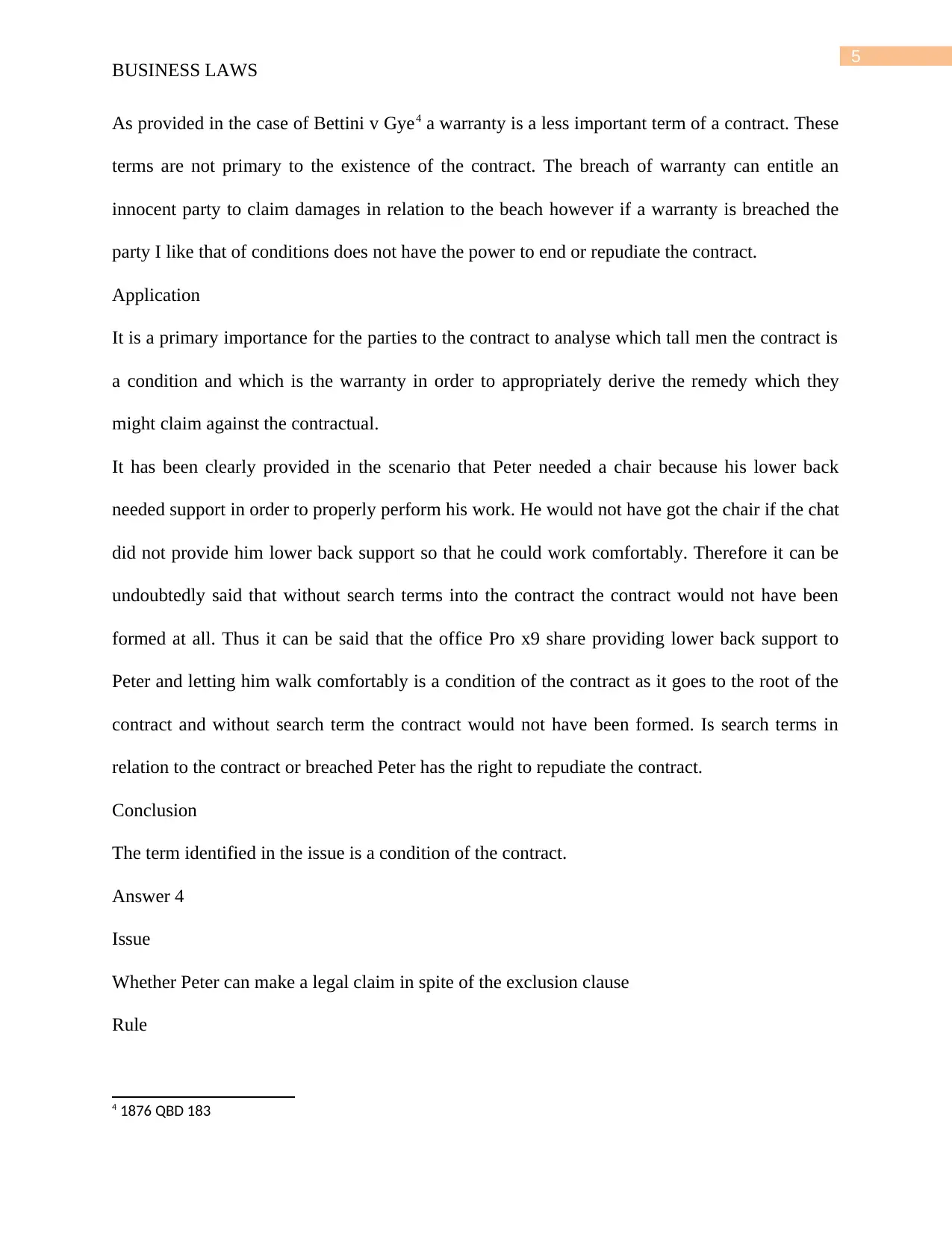
5
BUSINESS LAWS
As provided in the case of Bettini v Gye4 a warranty is a less important term of a contract. These
terms are not primary to the existence of the contract. The breach of warranty can entitle an
innocent party to claim damages in relation to the beach however if a warranty is breached the
party I like that of conditions does not have the power to end or repudiate the contract.
Application
It is a primary importance for the parties to the contract to analyse which tall men the contract is
a condition and which is the warranty in order to appropriately derive the remedy which they
might claim against the contractual.
It has been clearly provided in the scenario that Peter needed a chair because his lower back
needed support in order to properly perform his work. He would not have got the chair if the chat
did not provide him lower back support so that he could work comfortably. Therefore it can be
undoubtedly said that without search terms into the contract the contract would not have been
formed at all. Thus it can be said that the office Pro x9 share providing lower back support to
Peter and letting him walk comfortably is a condition of the contract as it goes to the root of the
contract and without search term the contract would not have been formed. Is search terms in
relation to the contract or breached Peter has the right to repudiate the contract.
Conclusion
The term identified in the issue is a condition of the contract.
Answer 4
Issue
Whether Peter can make a legal claim in spite of the exclusion clause
Rule
4 1876 QBD 183
BUSINESS LAWS
As provided in the case of Bettini v Gye4 a warranty is a less important term of a contract. These
terms are not primary to the existence of the contract. The breach of warranty can entitle an
innocent party to claim damages in relation to the beach however if a warranty is breached the
party I like that of conditions does not have the power to end or repudiate the contract.
Application
It is a primary importance for the parties to the contract to analyse which tall men the contract is
a condition and which is the warranty in order to appropriately derive the remedy which they
might claim against the contractual.
It has been clearly provided in the scenario that Peter needed a chair because his lower back
needed support in order to properly perform his work. He would not have got the chair if the chat
did not provide him lower back support so that he could work comfortably. Therefore it can be
undoubtedly said that without search terms into the contract the contract would not have been
formed at all. Thus it can be said that the office Pro x9 share providing lower back support to
Peter and letting him walk comfortably is a condition of the contract as it goes to the root of the
contract and without search term the contract would not have been formed. Is search terms in
relation to the contract or breached Peter has the right to repudiate the contract.
Conclusion
The term identified in the issue is a condition of the contract.
Answer 4
Issue
Whether Peter can make a legal claim in spite of the exclusion clause
Rule
4 1876 QBD 183
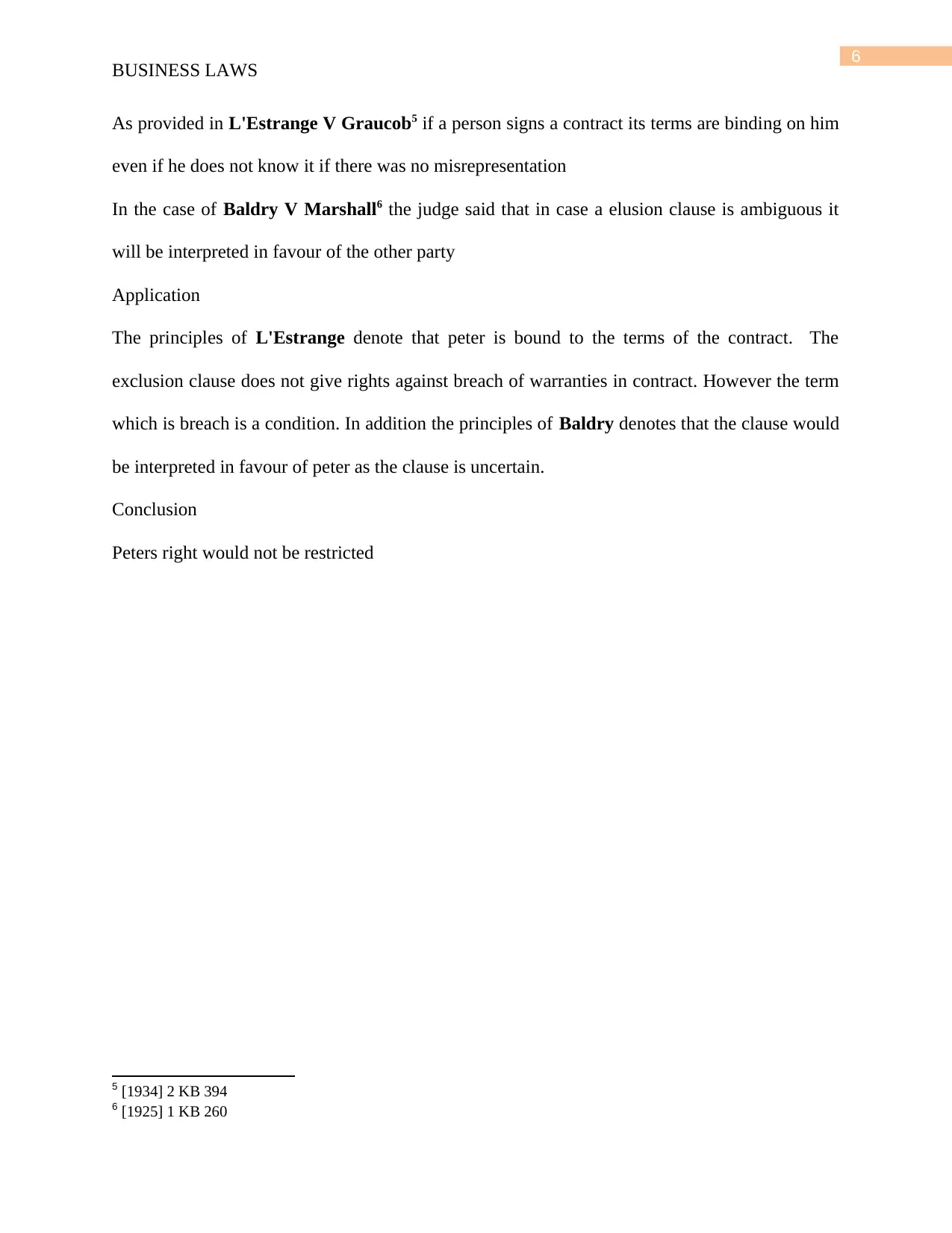
6
BUSINESS LAWS
As provided in L'Estrange V Graucob5 if a person signs a contract its terms are binding on him
even if he does not know it if there was no misrepresentation
In the case of Baldry V Marshall6 the judge said that in case a elusion clause is ambiguous it
will be interpreted in favour of the other party
Application
The principles of L'Estrange denote that peter is bound to the terms of the contract. The
exclusion clause does not give rights against breach of warranties in contract. However the term
which is breach is a condition. In addition the principles of Baldry denotes that the clause would
be interpreted in favour of peter as the clause is uncertain.
Conclusion
Peters right would not be restricted
5 [1934] 2 KB 394
6 [1925] 1 KB 260
BUSINESS LAWS
As provided in L'Estrange V Graucob5 if a person signs a contract its terms are binding on him
even if he does not know it if there was no misrepresentation
In the case of Baldry V Marshall6 the judge said that in case a elusion clause is ambiguous it
will be interpreted in favour of the other party
Application
The principles of L'Estrange denote that peter is bound to the terms of the contract. The
exclusion clause does not give rights against breach of warranties in contract. However the term
which is breach is a condition. In addition the principles of Baldry denotes that the clause would
be interpreted in favour of peter as the clause is uncertain.
Conclusion
Peters right would not be restricted
5 [1934] 2 KB 394
6 [1925] 1 KB 260
⊘ This is a preview!⊘
Do you want full access?
Subscribe today to unlock all pages.

Trusted by 1+ million students worldwide
1 out of 6
Related Documents
Your All-in-One AI-Powered Toolkit for Academic Success.
+13062052269
info@desklib.com
Available 24*7 on WhatsApp / Email
![[object Object]](/_next/static/media/star-bottom.7253800d.svg)
Unlock your academic potential
Copyright © 2020–2026 A2Z Services. All Rights Reserved. Developed and managed by ZUCOL.





